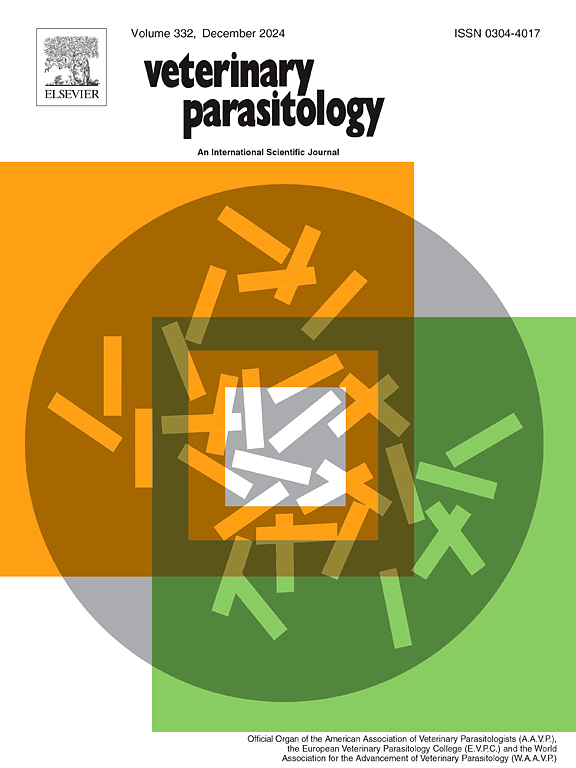Eucalyptus oil: A promising anticoccidial agent with multifaceted protective effects
IF 2
2区 农林科学
Q2 PARASITOLOGY
引用次数: 0
Abstract
In-feed preventive coccidiostat additives are regarded as the primary choice of coccidiosis control, whereas the lasting appearance of drug resistance seriously hampered its application. Eucalyptus oil (EUC) has been evidenced to possess anti-malaria and anti-helminth efficacy. Confronting the urgent requirements for novel anticoccidial remedies, EUC was picked to scrutinize its anticoccidial efficacy with the in vivo coccidiosis model. Birds were orally administrated with 8 × 104 sporulated oocysts and treated with 20 mg/kg EUC in feed during the whole experimental period, diclazuril (DIC) was selected as a positive control. The results manifested that EUC supplementation lessened cecal damage, oocyst shedding and mortality, and recovering body weight gain, so the anticoccidial index (ACI) was up to 160, indicating moderate anticoccidial activity. Additionally, the safeguarding effects of EUC on E. tenella-evoked cecal damage were respectively evidenced on macroscopic, histopathological, and ultrastructural levels. Meanwhile, EUC also exerted an inhibitory effect on redox imbalance and inflammatory response caused by E. tenella. Moreover, EUC treatment remarkably suppressed the invasion-related gene transcriptional level and enhanced the apoptosis mRNA expression level of coccidia. Besides, EUC noticeably decreased the Clostridium perfringens (C. perfringens) proliferation in vivo and in vitro. In conclusion, the EUC additive presented a moderate anticoccidial effect which is associated with the remission activity on E. tenella-induced cecal injury, redox imbalance, and inflammatory response which may be associated with inhibitory effect on Eimeria invasion and C. perfringens proliferation, and activating influence on coccidial apoptosis.
桉树油:一种有前途的抗球虫剂,具有多方面的保护作用。
饲料中的球虫预防添加剂被认为是控制球虫病的首要选择,但耐药性的持续出现严重阻碍了其应用。桉树油(EUC)已被证实具有抗疟疾和抗蠕虫的功效。面对对新型抗球虫药物的迫切需求,我们选择了桉叶油,并利用体内球虫病模型仔细研究其抗球虫功效。给鸟类口服 8 × 104 个孢子化卵囊,并在整个实验期间在饲料中添加 20 毫克/千克 EUC,同时选择地克珠利(DIC)作为阳性对照。结果表明,添加 EUC 可减少盲肠损伤、卵囊脱落和死亡率,并可恢复体重增加,因此抗球虫指数(ACI)高达 160,表明具有中等抗球虫活性。此外,EUC 对天牛肠虫引起的盲肠损伤的保护作用分别体现在宏观、组织病理学和超微结构层面。同时,EUC 还对天牛引起的氧化还原失衡和炎症反应有抑制作用。此外,EUC还能显著抑制球虫入侵相关基因的转录水平,提高球虫凋亡mRNA的表达水平。此外,EUC 还能明显减少产气荚膜梭菌(C. perfringens)在体内和体外的增殖。总之,EUC添加剂具有适度的抗球虫作用,这与它对天牛肠杆菌诱导的盲肠损伤、氧化还原失衡和炎症反应具有缓解活性有关,可能与它对艾美拉菌入侵和产气荚膜梭菌增殖的抑制作用以及对球虫凋亡的激活影响有关。
本文章由计算机程序翻译,如有差异,请以英文原文为准。
求助全文
约1分钟内获得全文
求助全文
来源期刊

Veterinary parasitology
农林科学-寄生虫学
CiteScore
5.30
自引率
7.70%
发文量
126
审稿时长
36 days
期刊介绍:
The journal Veterinary Parasitology has an open access mirror journal,Veterinary Parasitology: X, sharing the same aims and scope, editorial team, submission system and rigorous peer review.
This journal is concerned with those aspects of helminthology, protozoology and entomology which are of interest to animal health investigators, veterinary practitioners and others with a special interest in parasitology. Papers of the highest quality dealing with all aspects of disease prevention, pathology, treatment, epidemiology, and control of parasites in all domesticated animals, fall within the scope of the journal. Papers of geographically limited (local) interest which are not of interest to an international audience will not be accepted. Authors who submit papers based on local data will need to indicate why their paper is relevant to a broader readership.
Parasitological studies on laboratory animals fall within the scope of the journal only if they provide a reasonably close model of a disease of domestic animals. Additionally the journal will consider papers relating to wildlife species where they may act as disease reservoirs to domestic animals, or as a zoonotic reservoir. Case studies considered to be unique or of specific interest to the journal, will also be considered on occasions at the Editors'' discretion. Papers dealing exclusively with the taxonomy of parasites do not fall within the scope of the journal.
 求助内容:
求助内容: 应助结果提醒方式:
应助结果提醒方式:


